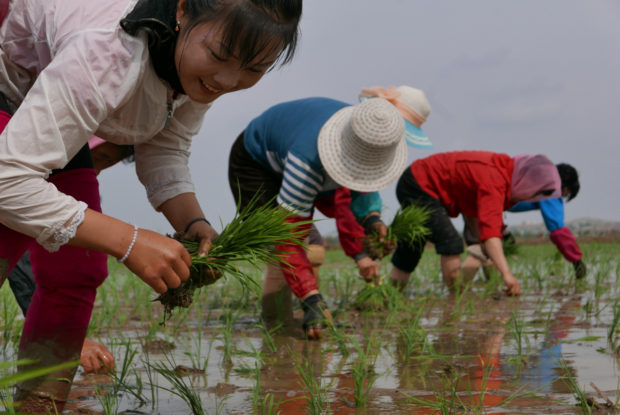South Korea vows to send aid to North quickly, may send food
SEOUL, South Korea – South Korea vowed Monday to move quickly on its plans to provide $8 million worth of humanitarian aid to North Korea while it also considers sending food to the country that says it’s suffering its worst drought in decades.
Lee Sang-min, spokesman of Seoul’s Unification Ministry, said the government will discuss its plans with the World Food Program and the United Nations Children’s Fund, through which the aid would be provided, so it reaches North Korean children and pregnant women quickly. South Korea is also trying to build public and political support for providing food aid to the North, either directly or through an international organization.

In this May 17, 2019, photo, North Korean farmers plant rice seedlings in a field at the Sambong Cooperative Farm, South Pyongan Province, North Korea. North Korean state media said last week that 54.4 millimeters (2.1 inches) of rain fell in the first five months of 2019, which it said represented the lowest level since 1982. U.N. food agencies said earlier this month that about 10 million people were facing “severe food shortages” after one of the North’s worst harvests in a decade. (AP Photos/APTN)
North Korea’s state media said last week that the country was suffering its worst drought in more than a century amid reported food shortages.
“The government will first discuss with international organizations over the provision of aid and take measures so that the support arrives (in the North) quickly,” Lee said. “On the matter of direct aid, we will consider the matter while sufficiently garnering the opinions of our citizens.”
South Korean President Moon Jae-in has expressed hopes that aid will help revive diplomacy and engagement with Pyongyang, which tapered off following a high-stakes nuclear summit between North Korean leader Kim Jong Un and President Donald Trump in February that broke down over mismatched demands in sanctions relief and disarmament.
But Moon’s government has yet to decide on concrete plans amid growing public frustration over North Korea, which resumed short-range missile tests recently that were apparently aimed at pressuring
Article continues after this advertisementWashington and Seoul.
Article continues after this advertisementNorth Korea’s official Korean Central News Agency said last Wednesday that an average of 54.4 millimeters (2.1 inches) of rain fell in North Korea from January to early May in 2019, which it said represented the lowest level since 1982. That was two days before the state-run Rodong Sinmun newspaper said the average precipitation of 56.3 millimeters (2.2 inches) from January to May 15 was the country’s lowest since 1917.
U.N. food agencies said earlier this month that about 10 million people were facing “severe food shortages” after one of the North’s worst harvests in a decade.
North Korean state media are currently campaigning to urge farmers to do their best with what they have, to grow as much as possible this year.
The Rodong Sinmun on Saturday urged North Korean farmers to meet state goals in food production in face of “hostile forces who don’t want us to become prosperous and … are seeking to make our people undergo shortage of food, bring to collapse their faith in socialism.”
“At our farm, we got an announcement about the dry weather conditions from our party and our state authorities, so we have taken advance measures to save water, like preparing the fields earlier than before, because we have to save water as much as we can,” said Kim Chang Jun, vice chairman of a cooperative farm in the village of Sambong, just outside the capital.
The last time South Korea provided humanitarian aid to North Korea through an international agency was in 2015, when it gave $800,000 to the U.N. Population Fund project to evaluate North Korean public health conditions.
The South has not provided direct food aid to the North since 2010.
Moon’s government first proposed providing $8 million to the WFP and UNICEF to help North Korean children and pregnant women in 2017, but the plans were halted amid a torrid run in North Korean weapons tests that year. An abrupt turn toward diplomacy in 2018 saw Kim meet with Trump twice and three times with Moon. /gg